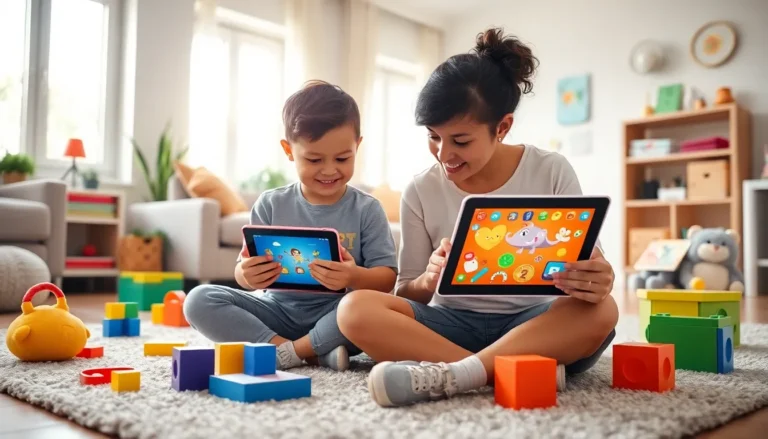In a world where parenting often feels like a chaotic circus act, solo parenting is the high-wire performance that deserves a standing ovation. It’s not just about tackling tantrums and juggling schedules alone; it’s about embracing the unique challenges and triumphs that come with raising kids without a partner. Forget the “single” label—this is solo parenting, where independence meets resilience, and every day is a new adventure.
Table of Contents
ToggleUnderstanding Solo Not Single Parenting
Solo not single parenting represents a distinct approach to raising children without a partner. This form of parenting emphasizes independence, resilience, and the ability to cultivate strong bonds.
Definition and Concept
Solo not single parenting refers to individuals taking full responsibility for their children in the absence of a partner. It encompasses nurturing their child’s emotional, physical, and social development. Parents engage with their children in meaningful ways while navigating daily life challenges independently. Emphasis lies on the proactive choices they make to foster a supportive environment, ensuring a nurturing atmosphere for their children.
Key Differences from Single Parenting
Solo not single parenting diverges significantly from traditional single parenting, often characterized by a lack of cooperative co-parenting. In solo parenting, individuals manage all aspects without any shared responsibilities or conflicts. Single parents frequently share custody or engage in ongoing communication with a co-parent, while solo parents embrace autonomy and self-sufficiency. Solo not single parenting also fosters a stronger sense of individuality, enabling parents to design parenting methods that align specifically with their family values.
Benefits of Solo Not Single Parenting
Solo not single parenting offers various advantages that contribute to both personal growth and family dynamics. Embracing this parenting style cultivates independence and resilience.
Independence and Personal Growth
Having sole responsibility enhances personal growth. Solo parents often develop stronger time management, financial planning, and problem-solving skills. These parents adapt to challenges, leading to increased self-confidence and independence. Engaging in hands-on parenting tasks encourages individuals to set and achieve personal goals. By navigating obstacles alone, solo parents tap into their resourcefulness, ultimately promoting a sense of autonomy. Each experience reinforces their identity, making them more self-reliant in daily life.
Stronger Parent-Child Bond
Stronger relationships develop between solo parents and their children. Spending quality time together fosters open communication and trust. Daily activities provide opportunities for meaningful interactions. Engaging in shared experiences allows for deeper emotional connections. Solo parents often become attuned to their child’s needs and preferences. This increased awareness results in a nurturing environment where children feel valued. Children raised in this supportive setting learn the importance of empathy and resilience, helping them thrive in various situations.
Challenges of Solo Not Single Parenting
Navigating solo parenting presents unique challenges. Each day brings a new set of responsibilities, requiring constant adjustment.
Time Management and Work-Life Balance
Time management poses a significant challenge for solo parents. Balancing work commitments with parenting duties often feels overwhelming. Prioritizing daily tasks becomes essential for maintaining stability. Scheduling activities such as school runs, meals, and playtime requires careful planning. Limited hours in the day mean parents often juggle multiple roles without support. Parents can benefit from utilizing tools like calendars and apps to organize their time effectively. A structured approach helps create a more predictable routine for both the parent and child.
Emotional and Financial Implications
Emotional well-being can take a hit during solo parenting. Facing the pressures of raising children alone often leads to feelings of isolation and stress. Developing coping strategies, like seeking support groups or counseling, provides valuable outlets for managing these emotions. Financial implications also play a critical role. One income may limit access to resources, affecting day-to-day living. Additionally, budgeting becomes crucial, ensuring that essential needs are met while planning for future expenses. Finding ways to alleviate financial strain contributes positively to the overall family dynamic.
Support Systems for Solo Not Single Parents
Support systems significantly enhance the experience of solo not single parents, providing much-needed assistance and community. Building a network fosters connection, which directly impacts emotional well-being.
Building a Community
Forming a community plays a crucial role in navigating solo parenting. Engaging with other parents offers shared experiences and emotional support. Local parenting groups, both in-person and online, create lifelong friendships and resources. Meetup platforms help connect with other solo parents who understand unique challenges. Community centers often provide activities and events tailored to families, enabling rich social interactions. Reaching out to neighbors or friends cultivates a support system that eases feelings of isolation.
Utilizing Available Resources
Accessible resources contribute significantly to managing daily challenges. Parenting support services often offer workshops focused on skill development in areas like budgeting and time management. Nonprofit organizations may provide counseling and therapy options tailored for parents. Online platforms offer a wealth of articles and forums addressing specific concerns. Local libraries frequently host parenting groups, providing both education and socialization opportunities. Resource websites can connect solo parents with financial assistance programs, ensuring essential needs are met. Engaging with these resources reinforces the ability to thrive in solo parenting.
Solo not single parenting is a journey filled with unique challenges and rewards. It empowers parents to cultivate their own parenting style while fostering strong relationships with their children. With the right support systems and coping strategies in place, solo parents can navigate their responsibilities with confidence.
Embracing this approach not only enhances personal growth but also nurtures resilience in children. As they face daily hurdles together, they build a foundation of trust and open communication. The experience of solo parenting may be demanding, but it ultimately leads to a fulfilling and enriching family life.








